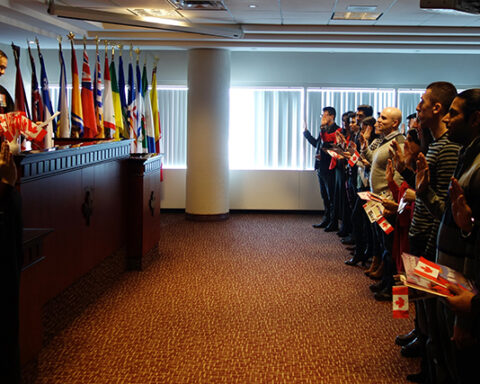Now that we know what the government has in mind for the Citizenship Act, let’s talk about the longer-term implications of the proposed changes.
Traditionally, Canadian citizenship policy has balanced “facilitation”—making citizenship easier to acquire — and “meaning” — ensuring integrity in citizenship tools and processes. Past governments inclined towards facilitation through a relatively easy and short acquisition process that eased integration through the extension of voting rights and other privileges.
The Conservative government made major shifts towards the “meaning” end of the spectrum: a more comprehensive study guide, the Discover Canada orientation package for newcomers a more difficult citizenship test, more rigorous application of language requirements, anti-fraud (residency) measures, an increased public profile for the citizenship program and ceremonies, and support for the Institute for Canadian Citizenship (ICC) and its various activities. Taken together, these measures improved the integrity of citizenship.
More hurdles for citizenship applicants
Citizenship and Immigration Minister Chris Alexander’s proposed changes take this further. They’re taking place in a context of ongoing economic and social globalization, driven by cheap travel and communications, making identity more fluid and varied — and making links between diaspora and domestic politics more complex.
Let’s look at how his proposed changes stack up. One of former Minister of Citizenship and Immigration Jason Kenney’s lasting legacies in the portfolio was greater integrity in the citizenship program. Most of the proposed changes focus on further increasing the integrity of Canadian citizenship, making it “harder to get and easier to lose.”
And so, Mr. Alexander wants to make it crystal-clear that residency means being in Canada and wants to extend the residency period required. He wants to expand the knowledge and language assessment to cover both younger and older applicants. He wants stronger penalties for fraud, and streamlined and broader authority for citizenship revocation, including a “national interest” provision for dual nationals.
He is ending the practice in place since the Diefenbaker government of treating all citizens the same, whether born in Canada or naturalized. The potential implications of such a policy change are broader than the specific issue of ‘national interest’ revocation.
Mr. Alexander also wants an “intent to reside” provision. As this only applies during the application process, and not after citizenship is granted, this appears largely symbolic.
One of the weaknesses of previous changes to the citizenship program pertain to implementation short-cuts and approaches that made citizenship less fair and more difficult to obtain for groups with lower educational or language levels (e.g., immigrants or refugees from Afghanistan, Somalia, Cambodia, Burma and Vietnam).
Mr. Alexander is silent on providing every applicant a fair chance. No commitment to focus group test citizenship materials for comprehension and readability. No commitment to provide additional citizenship knowledge and test preparation for groups that are having difficulties.
However, to Mr. Alexander’s credit, the remaining “lost Canadians” (largely descendants from those born before 1947) will have their citizenship recognized, and the children of Crown servants born abroad will be able to pass on their Canadian citizenship.
Harder to get and easier to lose
Importantly, Mr. Alexander has managed to maintain the overall competitiveness of Canadian citizenship compared to other countries like Australia, New Zealand, and the U.S. The government has managed to ratchet up requirements significantly without dissuading the increasingly educated and mobile immigrants Canada seeks from choosing Canada.
The proposed changes also reflect the need to improve citizenship business processes. Most are non-controversial, such as the removal of citizenship judges from the decision-making process, the ability to cancel incomplete applications, and allowing for electronic means to verify citizenship.
These changes, along with temporary increased funding, allowed Mr. Alexander to commit to reducing the processing time from the current two years plus to less than one year. Yet, unlike in Australia, he offers no ongoing quarterly reports to show compliance (ad hoc press releases do not cut it).
Mr. Alexander’s overall approach stresses enforcement, not citizenship promotion. Perhaps he believed the previous initiatives were adequate. However, there is an ongoing need for citizenship education, for applicants and for existing Canadians, as any survey about knowledge of Canada attests. More ambition here would reinforce the overall agenda of strengthening citizenship, including in Quebec, where there are opportunities and a need to do more.
Challenges remain
The challenge for all governments is how to balance citizenship as a “place,” assuming citizens remain in their country of immigration, and citizenship as a “status,” a more instrumental view of citizenship as a means to secure employment and other rights.
It is hard for any government to craft options that address the diverse needs of people applying for citizenship. Immigrants who choose Canada for economic reasons may have a more instrumental view of citizenship. Providing them with greater flexibility, and encouraging them to choose Canada, without weakening the meaning of citizenship, or providing additional opportunities for citizens of convenience, will always be a challenge. With the longer residency requirements and “intent to reside” provision, Mr. Alexander may be reducing the attractiveness to the more highly skilled and entrepreneurial immigrants.
Mr. Alexander has come down firmly on the side of citizenship as “place.” The emphasis on integrity and streamlined business processes is understandable, with the possible exception of differential treatment of Canadian citizens and dual nationals in revocation. His inattention to fairness issues and citizenship promotion is regrettable. However, taken together, Mr. Alexander’s proposed changes remain largely within the Canadian context of encouraging immigrants to become citizens, and remaining competitive with other countries.
Andrew Griffith is the author of Policy Arrogance or Innocent Bias: Resetting Citizenship and Multiculturalism. He is the former Director General for Citizenship and Multiculturalism at Citizenship and Immigration Canada (CIC). He has worked at Canadian Heritage, Service Canada, Industry Canada and Privy Council Office, in addition to Foreign Affairs and International Trade Canada, where he had a number of domestic and international assignments.
Andrew Griffith is the author of Multiculturalism in Canada: Evidence and Anecdote, Policy Arrogance or Innocent Bias: Resetting Citizenship and Multiculturalism and many other works. He is a former Director-General of Citizenship and Immigration Canada, Citizenship and Multiculturalism branch. He regularly comments on citizenship, multiculturalism and related issues, in this blog and the media.





